At age 14, Peter Capaldi started writing in to Doctor Who frequently asking for photos. At his announcement special, they read one of the letters he wrote in after the 10th anniversary special saying he hoped that there would be a 25th anniversary special in another 15 years. But when he wrote in demanding to be the head of the Doctor Who fan club and was told the post was filled, he both started harassing the BBC and the current head of the fan club. The producer's secretary, Sarah Newman, became so enraged that she was once recalled saying "I wish the Daleks or someone would exterminate him or something to that effect."
Now he's the fucking Doctor!
Who is Peter Capaldi? I've been asking myself that since his announcement as the 12th Doctor. As I've gone on a Peter Capaldi marathon since the announcement, I've learned a few things about him. He doesn't have a lot of leading roles in his long career, but he does seem to have been nominated for awards in the few that he does have. That's a pretty good sign of an underappreciated actor. In fact, it's how you could describe most classic series Doctors in their pre-Doctor Who careers: someone who has worked tirelessly in the background, only to get a few good parts here and there. People like this are usually known as "character actors," but, to be honest, character actors usually play the same kind of character in every single thing they play. But that's not what Peter Capaldi is. Peter Capaldi has the one attributes I admire most in any actor, the attribute I judge most of my fellow slam poets by, the attribute I judge my favorite musical artists by, and the attribute that makes me so admire Steven Moffat:
Range!
Peter Capaldi has played a sniveling middle man (John Frobisher in Torchwood: Children of Earth), a fallen angel (The Angel Islington in Neverwhere), and--most famously--a hypermasculine bulldog (Malcolm Tucker in The Thick of It/In the Loop), plus a ton of other very diverse roles. And he can handle each one with the same level of talent. When watching him as Frobisher in in Torchwood and watching him as Tucker in The Thick of It/In the Loop, you can forget that he's the same person and, if you watched the two with a long gap in between them, you might not even remember him as his character in the other one. He transforms into very different people in those two roles, and not just because he can slip easily back and forth between a Scottish accent that's even thicker than the one he has in real life and a basic British accent.
A Dashing Doctor?
Like I said in the last blog I posted, we've had older Doctors, and we've had attractive Doctors, but we've never really had an attractive older Doctor. In fact, and I can't believe this is true, but, depending on when you count from (his first appearance as the Doctor or his first full episode as the Doctor) Peter Capaldi will actually be either the second oldest or the oldest person to play the Doctor, based on their exact age at the time they debuted in the role. The difference between the age William Hartnell was when he debuted as the Doctor and Peter Capaldi's age right now is a matter of months, not years. And yet clearly, Capaldi has aged much better than Hartnell ever did:
 |
| It's like Hartnell is looking into a magical mirror that shows you what you wish you looked like. |
The following are pictures of Peter Capaldi looking very dashing and handsome:
And now these are some pictures of Capaldi looking like a frumpy doofus:
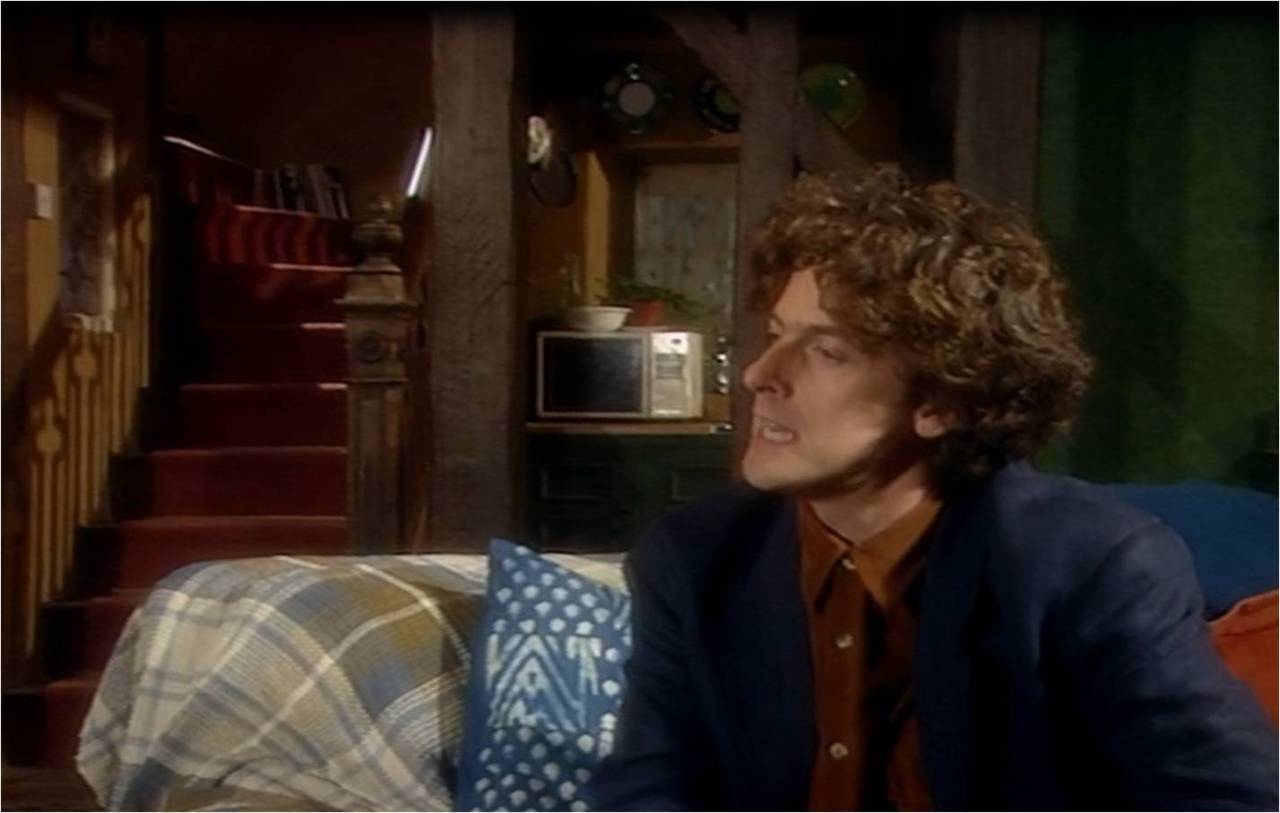 |
| Some of these pictures are thanks to what I swear to God is a real Tumblr that I did not create: Fuck Yeah Peter Capaldi's Hair |
Now, what's the difference between the pictures on the top and the pictures on the bottom? Capaldi isn't in character for anything in the pictures on top. Peter Capaldi can be a quite handsome man, when he isn't playing some sort of funny-looking loser. So, obviously, we hope, for the sake of the screaming fangirls, that the hair and make-up people allow Capaldi to actually be a good looking man. The hardest part in going older with this Doctor is that Tennant and Smith built up such a female audience with their sex appeal, that the next Doctor has to be sexy. This is about as sexy of a 55 year old man that they could have gotten.
A Scottish Doctor?
Most Scottish actors can do a British accent. It's pretty necessary. Just like American actors from the South should probably know how to do a neutral American accent. Scotland is, after all, technically still part of the United Kingdom, so at least half of your work is going to be asked to do a lot of roles where a Scottish accent just isn't appropriate. Peter Capaldi is no different. The question is, what accent will he use to play the Doctor?
Capaldi will be the third Scottish actor to play the role. The first was Sylvester McCoy, the second David Tennant. I always thought it particularly strange that McCoy played the role with his natural accent, where Tennant did it in his fake British accent. My friend Victor once joked that the reason was because, by the time they hired David Tennant, they knew people were actually watching the show. But it does demonstrate that, in canon, it has been established that the Doctor can change accents upon regenerations. As the 9th Doctor said when questioned about his Northern accent, "Lots of planets have a north!" (I'd love to hear Peter Capaldi say at some time "Lot's of planets have a Scotland!")
Capaldi's Scottish accent actually sounds better to me. It's his natural accent, it makes him seem more like his natural self. And it's a sexy accent, unlike Tennant's natural accent. Tennant's natural accent makes him sound like a dog with a 10 foot tongue is barking at you. The only problem is that Capaldi's Scottish accent is way harder to understand, at least to an American ear. Just watch Thick of It and see how many jokes you miss because of that accent. However, Moffat's a Scot too, and he might be more open to a Doctor with a Scottish accent than Davies was when he cast Tennant. After all, Karen Gillan offered to play Amy Pond with her British accent, and Moffat wouldn't have it. Instead, he rewrote the character to be Scottish.
Now, to look at some of the roles our future renegade Time Lord has done in the past:
Local Hero
This is considered to be Capaldi's big break, really. It was his first major part, and he was in a movie with Burt Lancaster, so it must have seemed like a pretty big deal at the time. What I found really strange about this movie is how much I really enjoyed it...without understanding why. The movie seems to have very little discernible plot and virtually no conflict whatsoever, but I still found it wonderfully pleasant to watch. Maybe it's just because the village it was shot in is so fucking beautiful.
It's about a company in Houston that decides that they want to build an oil refinery in Scotland, which requires them to buy out this entire small village. "Mac" MacIntyre (Peter Riegert) is sent to try to talk the village into selling because of his success with past deals like this, but also because the company mistakes him for a Scot because of his last name, which is actually an Ellis Island special. Danny Olsen (Peter Capaldi) is the representative of the company in Scotland and accompanies Mac in his mission. Mac finds little resistance from the town, as they're actually so excited they have to hide their town meetings about it because they worry that Mac will lower the price when he sees how ecstatic they are about selling. But he still starts to doubt that he should be buying this village.
Capaldi's role is central, yet subdued. His character is a young up and comer who is eager to please, but also shy. He has the only love interest in the whole movie, and it seems like that was on purpose so they'd actually have some slight love story in it. But the main reason I want to bring up Local Hero is because of the absolutely, brilliantly hilarious way that Peter Capaldi runs in the movie. Watch (I tried to link it to the specific second he runs, but I can't, so just watch from 1:44:40 for about 30 seconds just to watch him in all his silly running glory):
Wee, I'm an airplane!
The Vicar of Dibley
Capaldi has done a lot of small roles here and there that really don't amount to much and didn't allow me to get a good idea of what his acting abilities are like. One of these is the long running sitcom The Vicar of Dibley where he appeared twice. His second appearance is simply bizarre and I don't know why they even bothered to bring him back. But his first, while not giving me an idea of what kind of actor he is, made me think of one particular thing:
Interestingly enough, the bottom image in my list of frumpy looking haired versions of Capaldi was from The Vicar of Dibley where he was described as very attractive and female characters were swooning over him. Even for the crazy hair of the early- to mid-90's, that seems a bit of a stretch to say that that's an attractive hairstyle. I think people were told to pretend that he was attractive, the same way that classic series Doctor Who actors were told to pretend that ridiculous monsters in big, obviously fake rubber suits are scary.
Franz Kafka's It's a Wonderful Life
This isn't something that Capaldi was in, but rather a short film he wrote and directed. The entire thing is on YouTube, in all it's fucked up, bizarre splendor:
The film stars the Great Intelligence himself, Richard E. Grant, as Franz Kafka writing his famous work, The Metamorphosis and finding inspiration in what appears to be some sort of drug addled dream. It actually won an Oscar and a BAFTA. The film looks like some sort of over-the-top experimental college film, but it was actually commissioned by BBC Scotland as an official comic skit. I'm glad, because if this wasn't meant to be funny, I'd lose a lot of respect for Capaldi.
Peep Show, Midsomer Murders, Foyle's War
Like I said, Capaldi pops up in a lot of little roles here and there. These are three that I found just because they were on Netflix and I was curious. My girlfriend and I are watching his most famous work, The Thick of It, together, so when she's not around I look into some of Capaldi's smaller roles. It whets my curiosity for his more significant roles.
I lump these all together because of the general similarity of his characters in these three shows. Peep Show is a great Seinfeld-ian sitcom that I've watched all the way through before. Midsomer Murders is one of those detective dramas for people over 70 like Murder She Wrote that just allow them to pass time until they die. Foyle's War is a period drama about civilian life during World War II with a kind of detective angle. In both Peep Show and Foyle's War he plays your typical left-wing radical college professor/intellectual, while in Midsomer Murders he plays an overzealous choir director. They're all the same general type of character: educated, stuffy, stuck up. If there's anything close to a Peter Capaldi stock character, this is it. He does have range, but it seems that a lot of people want to pick him up to play stuffy intellectuals.
Neverwhere
 |
| That which takes the image of an angel, does not necessarily become, itself, an angel. |
Like I've said before, Capaldi has been in a lot of things I've seen that I didn't remember him from because I never bothered to learn who he was. Funny thing how he's now going to be the star of my favorite show. I had seen Neverwhere in college and didn't remember him, but I remembered his character and I loved his character.
Neverwhere is the creation of the legendary fantasy/sci-fi writer who recently became a Doctor Who writer, Neil Gaiman. It started out as a TV mini-series, but Gaiman, disappointed with the TV version, decided to turn it into a novel to tell the story the way he really intended to. Then it became a radio drama. And a comic book. And a play. And, for $10,000, Neil Gaiman will come to your bedside with a lute and perform a musical version of it in perfect iambic pentameter. Seriously, Neverwhere has been made into too many different things. And, as Gaiman himself pointed out in a tweet recently, Benedict Cumberbatch played the Angel Islington in the radio play version of Neverwhere, so one Islington is now the Doctor and one is Sherlock Holmes, both working under Steven Moffat.
This is going to get pretty spoilerish about Neverwhere and since, upon rewatching the mini-series recently, I found it to be much better than I remembered, I don't want to spoil it for you. Neverwhere was made with such a small budget and is shot on poor quality video that I think I wrote it off when I was a pretentious film student. In reality, they did some really great things to make a really creepy story with some really inexpensive special effects. So go watch it if you haven't, and highlight the following to read it if you have seen it.
Okay, so if you've highlighted this, you should know the plot already: the Angel Islington, who had once watched over Atlantis, was banished to London Below to take care of that city in a way that he failed to with Atlantis, having let Atlantis fall. To escape from his prison, required a key protected by the Black Friars and the key had to be operated by the Lady Door. This was to ensure he wasn't released until his punishment was up. Islington, however, chose to take matters into his own hands and trick Door into getting the key for him using an elaborate ruse that began with having her family killed.
What Neverwhere does that I've always found interesting (Gaiman might have said this on one of the audio commentaries, but it's been so long since I listened to them and I don't feel like doing it again) is that it reverses the symbolism of black and white. Black is associated with evil in our society, where white is associated with good. "White hats" and "black hats" are terms used to describe good and evil characters, derived from the imagery used in westerns. Some have pointed out the unfortunate racial implications of this, suggesting it contributes to an association in the mind with darkness and evil. While I understand this argument, we also have to keep in mind that the dark is something that humans are naturally afraid of because it takes away their sense of sight.
Neverwhere reverses these black and white symbols. Dark colors and even dark lighting seem to denote good people, where white and brightness--particularly in the case of Islington--are associated with evil. Partially, of course, that's because Islington is an angel, but I still feel like it's a wonderful reversal.
Neverwhere demonstrates one of Capaldi's defining characteristics, and that's his ability to play the line between good and evil very well. Islington is the villain of the story, but he is also an angel, an angel that begins the story by tricking Door and Richard into thinking he's on the side of good. He has to be a wolf in sheep's clothing, and he does it very well. Even when we see the true face of Islington, he performs this evil role with a frighteningly sweet and soothing tone in his voice. It adds to the creepiness of Islington's betrayal.
Strictly Sinatra
The only feature length film that's been written and directed by Capaldi. I got literally 10 minutes of this movie before I got so bored I gave up. I love you as an actor, Peter. Stick to acting.
Torchwood: Children of Earth
It was actually pretty funny and coincidental that I chose to rewatch my favorite season of Torchwood about one week before the big announcement, having no idea that I was starting my 12th Doctor viewing marathon a week early. I never would have dreamed in a million years that I was watching the next Doctor.
No spoiler warnings here. If you're reading this, you should know Children of Earth.
Frobisher is a pathetic character, even in the classic Greek sense of the term. He evokes pity and sympathy from the audience. His everyman/middleman character leads the viewer to wonder what they would be brought to do in such a horrible situation. Again, Capaldi shows his strength at playing the line between good and evil. Is Frobisher a good or a bad person? That's a tough question to debate. By certain concepts of morality, particularly utilitarian morality, he makes a morally correct choice. By other concepts of morality, he's doing a horribly immoral thing.
Even his final action, killing himself and his family, can be conceived as moral, since it is an attempt to save his family from a fate much more horrible. There was nothing, in his view, that could be done to save his children from living a vegetative life as the drug that an alien race gets high off of. So he euthanized them, in a way.
Frobisher is another example of Capaldi's impressive range, because I don't see a speck of the pathetic Frobisher in his performances as the Angel Islington or as Malcolm Tucker, as we shall see in a bit.
Thick of It/In the Loop
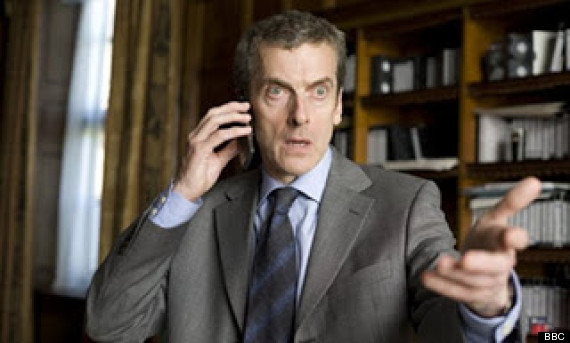 |
| "We're being invaded by aliens with bloody plungers for hands? We really are at the bottom of the fuckin' food chain." |
Now to the meat of the piece. This is Capaldi's most famous work, and with good reason. Thick of It is a brilliantly funny political comedy that is like a cross between House of Cards and the British version of The Office. In the Loop is a related movie, shot in both England and America, which stars many of the same actors as Thick of It playing very similar characters to their Thick of It characters, but with different names and positions. Peter Capaldi is one of only three people in the movie who actually play their own characters, making it a sort of half-spin off to Thick of It. It seems to me that they wanted to do something bigger than Thick of It, but wanted it to take place in a sort of separate universe so that it wouldn't have lasting implications for the plot of Thick of It.
Capaldi's character is Malcolm Tucker, is the government director of communications, a sort of bulldog from the Prime Minister to keep everyone's public image in check. He does this by screaming profanities left and right, bullying government employees into submission. The show follows the fairly irrelevant office of the Secretary of State for Social Affairs and Citizenship. The Secretary of State changes between Seasons 2 and 3, and that was a pretty big shift in the show as it seems to have enhanced Capaldi's role. In the first two seasons, the pathetic Hugh can be easily bullied, so Tucker didn't have to keep showing up to shout him into towing the line. The third and fourth seasons feature Hugh's replacement, the more assertive (yet still not that assertive) Nicola Murray. This leads to Malcolm Tucker being a heavier focus of the show as he fights it out with Nicola. It seems to me that Hugh was supposed to be the center of the show, but after two seasons they realized how much better of a focal point Malcolm Tucker was and shifted it towards him.
Is Tucker a good guy or a bad guy? Again, Capaldi shows a talent for playing moral ambiguity. His primary focus seems to be keeping the government stable. As the Christmas Special, "Spinners and Losers," demonstrated, his desire to keep the government stable is mainly to protect his own job. He doesn't show a lot of loyalty to anyone in particular in "Spinners and Losers." Does he care about the government's job to serve the people? Doubtful. He's part of the liberal party, so it's possible that deep down he tears people to shreds and fights to keep the government stable so that it can help the people, but I doubt that he cares much either way what the government policies are.
In In the Loop, he does, in the end, start to push to start the war in the Middle East. But I think it becomes pretty clear that Tucker didn't care whether the UK and the US went to war with the Middle East or not. If the government told him that they wanted him to stop the war, he would probably have done his job just as well, barking and threatening to disembowel everyone around him to get it done. For all of his forceful controlling of other people, Tucker is, himself, a puppet. He'll do whatever the Prime Minister thinks is appropriate.
I think this was really the role that won Capaldi the spot as the Doctor. He was a middling actor until this, mostly playing small roles and rarely getting first billing for anything. Capaldi really gained his notoriety for this role in particular. It's won him nominations for dozens of awards. He deserves this fame for this role in particular. His expletive fueled tirades are pulled off so effortlessly that you believe Tucker would have to be a raging genius to be able to come up with all of this bizarre violent imagery off the top of his head. And, most importantly, as I pointed out, I don't see a touch of any of his other characters in his portrayal of Malcolm Tucker. Tucker is a different man with a different face from Islington or Frobisher. And he fits perfectly into the skin of all three disparate characters.
Conclusion: A Great Doctor!
After studying all of his work, I'm really satisfied with the casting of Peter Capaldi as the 12th Doctor. I can see the grandfatherly wisdom of the first 3 Doctors in his face. Yet, despite being the oldest Doctor now (more or less), there have been several who have looked older than him. He has the wisdom of age in him, and yet the vitality of youth. The diversity of his work leaves a lot of avenues open for how he will choose to portray the Doctor.
A lot of people have suggested that he can bring some darkness back to the role, like Christopher Eccleston. (Personally, I think that people who call Eccleston's Doctor dark confuse darkness with meanness.) I don't know if he will or not. He could bring a lot of depth and many layers to his Doctor. I can imagine someone both stern and loving.
I've said that the two main characteristics of the Doctor across all of the regenerations are compassion and curiosity. In some Doctors, one or both of these traits aren't easily visible, but they are always there in abundance, even if they're hidden. Capaldi's talent for the mixing of good and evil can bring out the darker more violent side of the Doctor, but will not likely hide the compassion and curiosity at the same time.
"The Doctor lives his life in darker hues" the Great Intelligence warned us. "And he will have other names before the end. The Storm, the Beast, the Valeyard." Will Peter Capaldi bring us the darker hues? He'll be supported by the writing of the great Moffat, master of the dark fairy tale. Peter Capaldi's seasoned acting ability and Moffat's writing (assuming he gets some of the magic back in Season 8) is a perfect combination for a really strong outing for the first older Doctor since the classic series.
Peter Capaldi, on behalf of Whovians everywhere: We can't wait to see you get started!



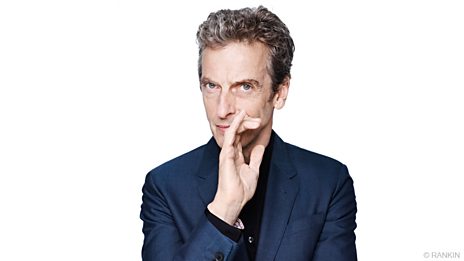
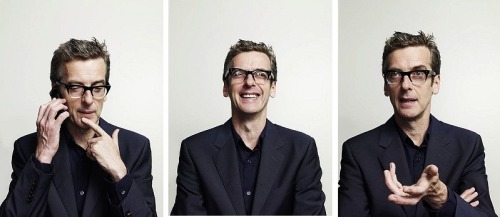
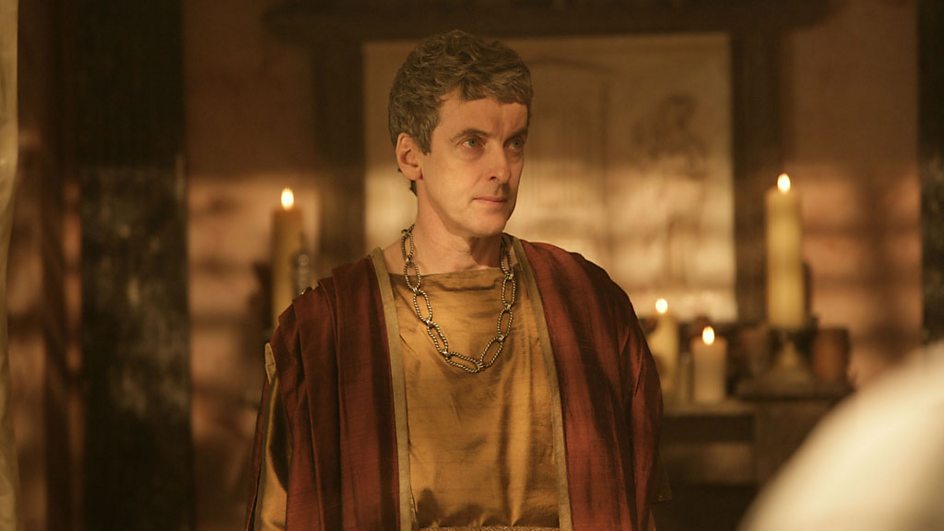
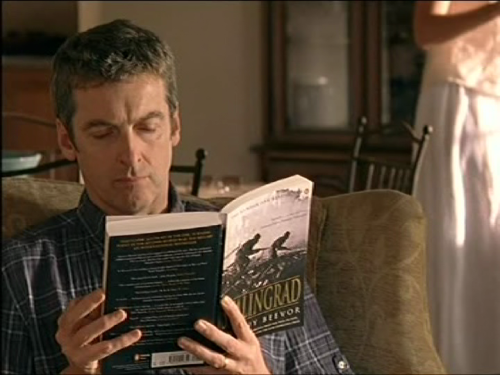

Scottish accents are British accents so what you stated doesn't exactly mike sense.
ReplyDelete